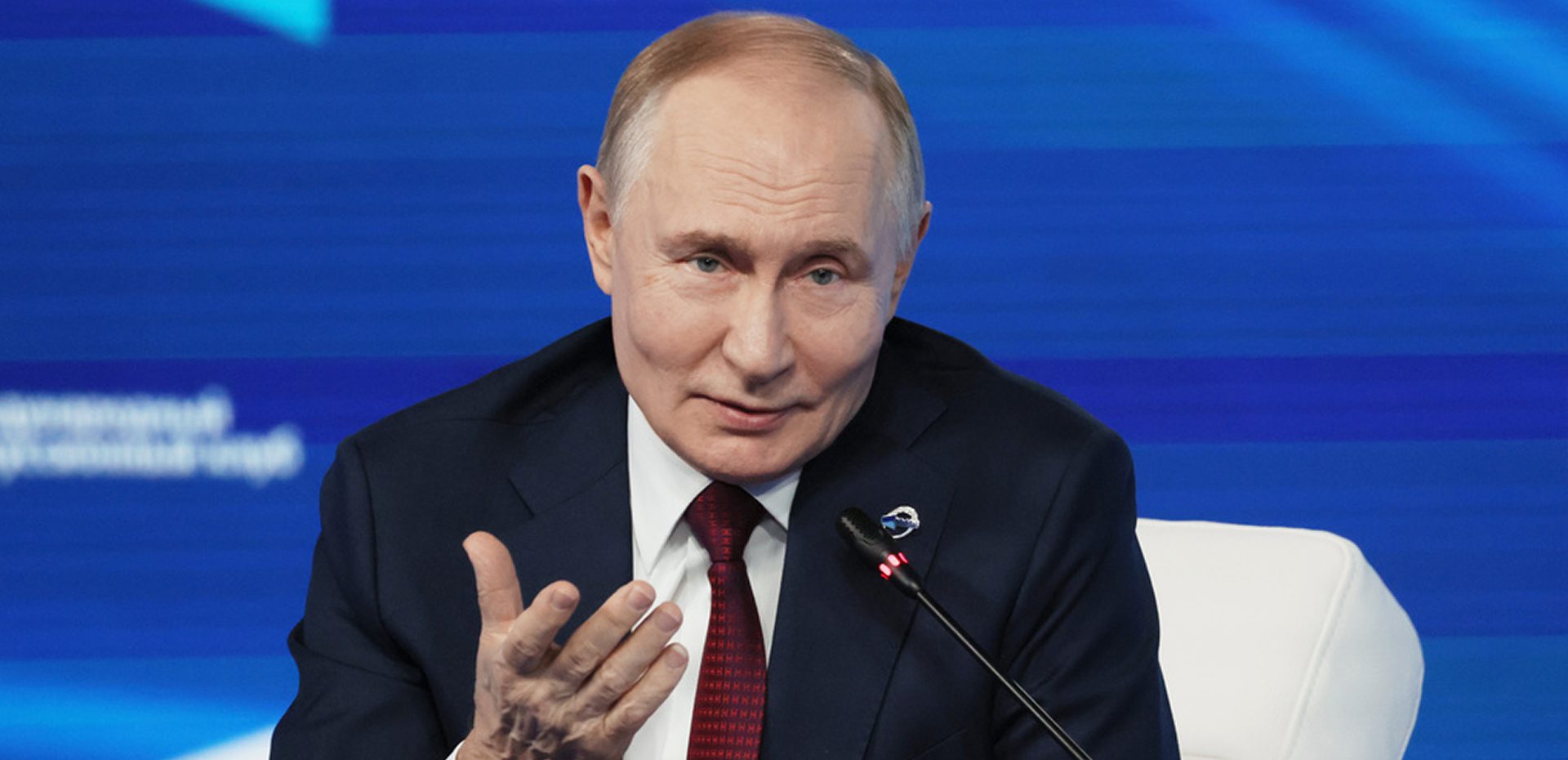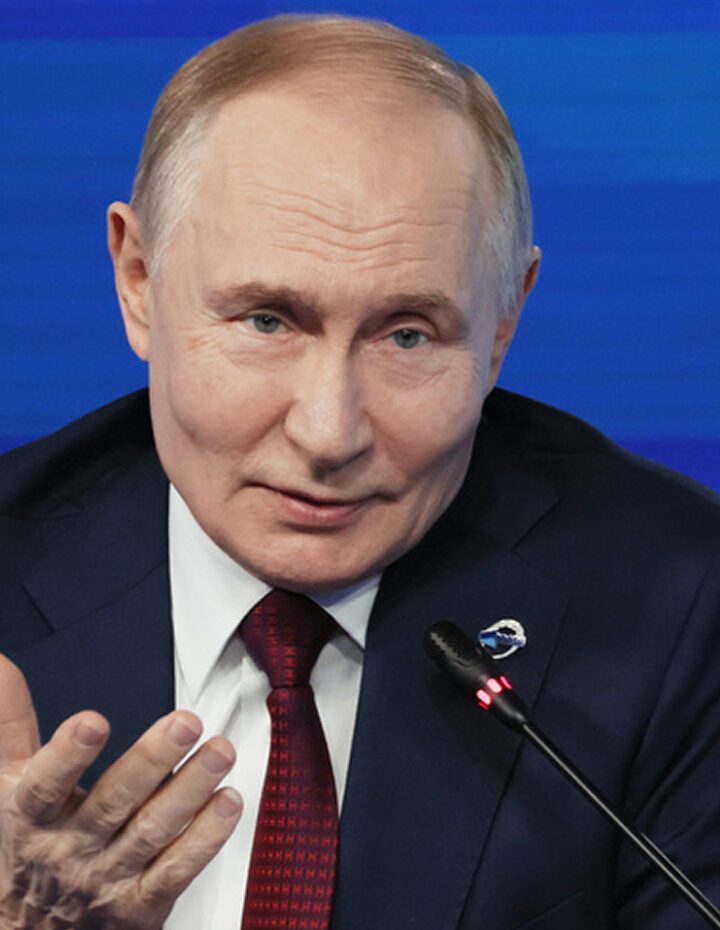Vladimir Putin’s speech at the Valdai Club on October 2nd demonstrated a fully formed ideological framework which presents Russia as a centre of power in a world where the previous rules no longer apply. Rejecting dialogue with the West, Putin proclaimed the advent of a ‘post-global’ era of managed chaos, in which sovereignty and adaptability outweigh institutions and norms. This worldview combines anti-liberal rhetoric with elements of American right-wing discourse, on top of confidence in the regime’s stability, an economy adapted to wartime conditions, and a society reconciled to war and isolation. For Europe, this is a signal of Moscow’s readiness for a prolonged confrontation – and of Putin’s conviction that his strategy of dividing the West is bearing fruit.
From chaos to a new world order
Putin’s address at the 22nd meeting of the Valdai Club continued the line he has pursued for nearly two decades. The key themes – criticism of Western hegemony, the defence of sovereignty, and the assertion of Russia as an independent centre of power – have featured in his speeches since the late 2000s. However, whereas the idea of multipolarity once implied a search for a new balance in relations with the West, it has now become a political justification for breaking them off altogether.
Putin declared that the era of Western dominance has come to an end and that Russia is an equal actor in the new global architecture. He accused the West of seeking to maintain control through sanctions and the imposition of ‘false rules’, contrasting this with the right of states to determine their own path.
This rhetoric closely echoes the key theses of the Valdai Club’s annual report, presented the day before entitled ‘Dr Chaos or: How to Stop Worrying and Love the Disorder’. The report argues that the modern world has entered an era of post-globalisation: a period of complex but nevertheless stable disorder in which regional initiatives, ad hoc alliances, and mediation by great and middle powers come to the fore. Countries not directly involved in the confrontation between the West and Russia – the so-called ‘global majority’ – have become the beneficiaries of a new era in which power is defined by the ability to adapt.
The concept of the ‘global majority’ underscores the perceived injustice of the existing international order, which, in the Kremlin’s view, serves Western interests. Putin presents the weakening of the ‘collective West’ and the transformation of the global system into one that is ‘free’ and ‘democratic’ as a precondition for future ‘polyphony’ and ‘harmony’ in international relations.
In this context, Russia is portrayed as the political voice of the ‘global majority’ – the first country to reject imposed rules and to demonstrate that an alternative path is possible. Against this backdrop, its ties with the Global South – which, in the Kremlin’s interpretation, is becoming more successful than the West – are presented as evidence that Russia is not isolated but integrated into the ‘real’ distribution of power, and therefore sees itself not as a loser, but as a winner.
The illusion of convergence
In promoting his own worldview, Putin likely assumes that his positions partly align with those of the Trump administration, adopting rhetoric that resonates with American right-wing discourse.
This is particularly evident in the attitudes of Putin and the Trump administration towards Europe: both criticise European elites for bureaucratism, dependency, and a loss of autonomy, albeit for different reasons. For JD Vance, Europe represents a civilisation that has lost its spiritual compass and must return to traditional values; for Donald Trump, it is a partner from which Washington expects greater economic and military self-reliance; for Putin, it is the weak link through which the unity of the West can be undermined.
In his speech, Putin combined elements of both American politicians’ rhetoric: from Vance he borrowed the notion of a moral crisis, and from Trump the image of Europe as a weak partner. Yet while Trump and Vance speak of the need for reform, Putin speaks of decline and inevitable collapse: for him, the ‘division of the West’ is not a risk but a strategic goal.
Even so, within this framework, Putin sees opportunities for tactical rapprochement with parts of the American establishment that share his view of the world as an arena of competing sovereignties. His previously categorical anti-American rhetoric sounded more restrained this time – a sign that Moscow still anticipates future advantages from relations with this US administration.
At the same time, Putin remains convinced that Russia retains the strategic advantage in the war against Ukraine, both on the battlefield and in any potential negotiations. In his view, the Ukrainian army is unable to alter the balance of power due to a shortage of personnel, while Russia maintains the initiative, moral superiority, and sufficient resources to sustain military operations. Even the possible supply of American Tomahawk cruise missiles to Ukraine, he argued, would not fundamentally change the balance of forces but would instead lead to military escalation and undermining of the emerging improvement in relations between Russia and the United States.
However, Putin’s confidence is not supported by the facts: the Russian army is advancing very slowly, and there are no immediate signs that it will achieve an operational breakthrough on the front line in the foreseeable future.
Sources of confidence
Beyond his perception that global developments are unfolding in line with his own worldview, Putin’s demonstrative confidence rests on domestic factors: the relative resilience of the economy, the manageability of the political system, and the consolidation of society.
Although the Russian economy is stagnating – or, as Putin claims, undergoing a phase of ‘managed cooling’ – it is far from collapse, and its condition is unlikely to prevent the continuation of the war at the current level of expenditure (around 6.5 per cent of GDP) for a long while, possibly years even if living standards may suffer. After the severe shock of 2022, Russia has adapted to Western sanctions, which are now likely to have only a limited impact on budget revenues, even if further expanded.
Despite internal risks – above all, the ageing of key figures, including Putin himself – Russia’s political system remains stable, adoptive and fully subordinate to the president. Core institutions have lost their independence, and power is concentrated in Putin’s hands and in structures directly linked to him. The elite is being renewed through the promotion of personally loyal figures – former presidential bodyguards, officials’ children, and young technocrats – while older players are gradually being pushed aside. The intensification of preventive repression against officials and businesses further consolidates this model.
Although Russian society is weary of the war, it has also come to terms with the prospect of a prolonged conflict. Russians no longer fear confrontation with the West, assuming that, as in previous wars, it will take place largely beyond the country’s borders and will not require a new wave of conscription.
In general, the structure of Russian society has changed as a result of the war: the advantage now lies with the less educated and anti-modernisation segments, which as a whole are sympathetic to an authoritarian state. The pro-war minority now appears to be the most organised and politically assertive. It expects continuation of the war to bring greater success on the front. At the same time, the conformist majority could become less supportive if the war starts to have a greater impact on living standards. Equally, the pro-war minority will be opposed to ending the war on terms that fall short of Ukraine’s defeat. Both courses pose risks for the Kremlin.

